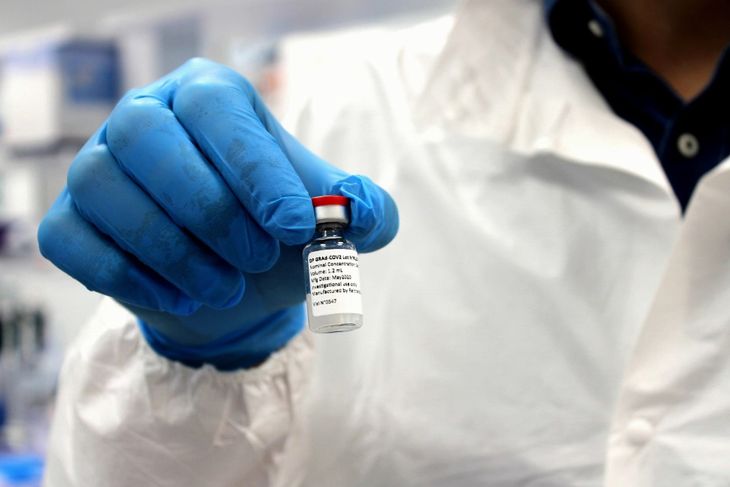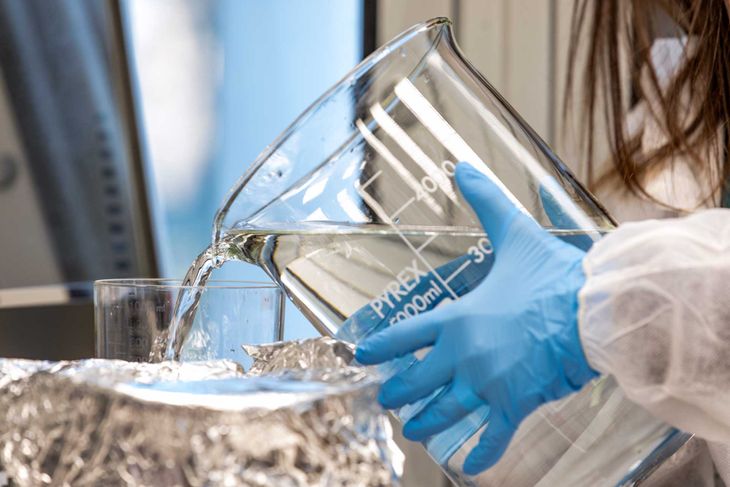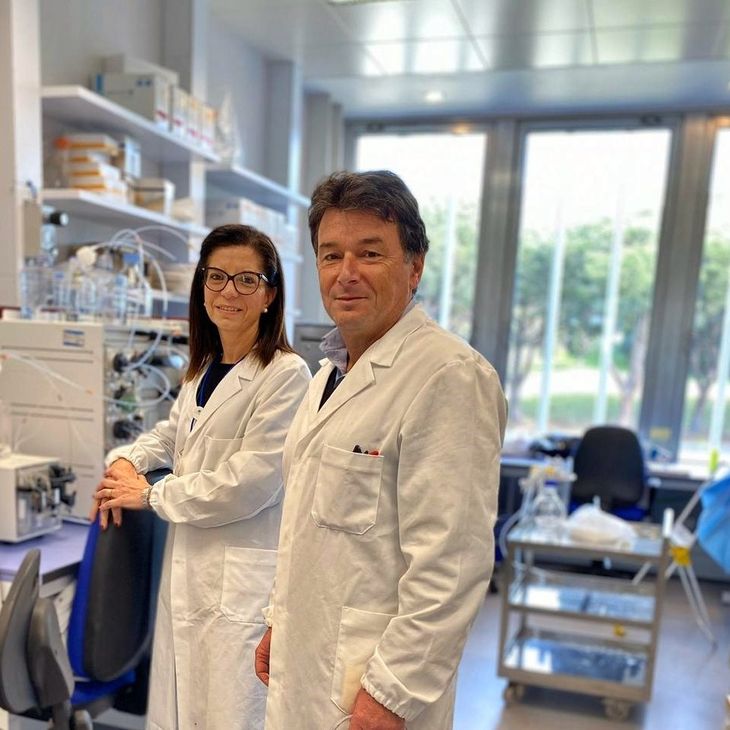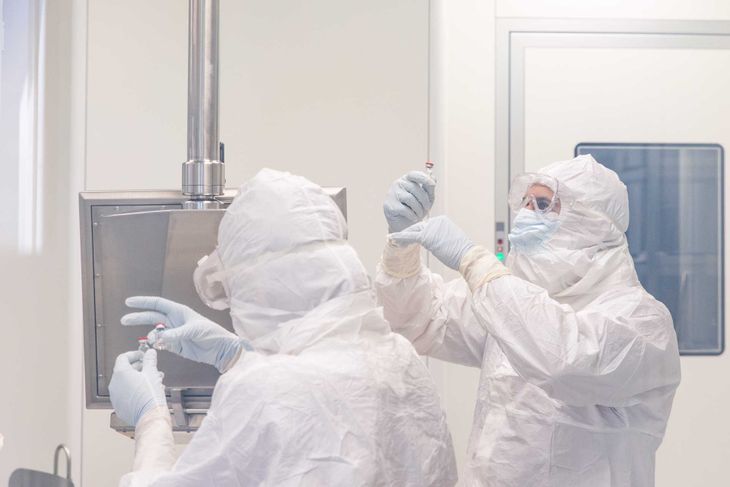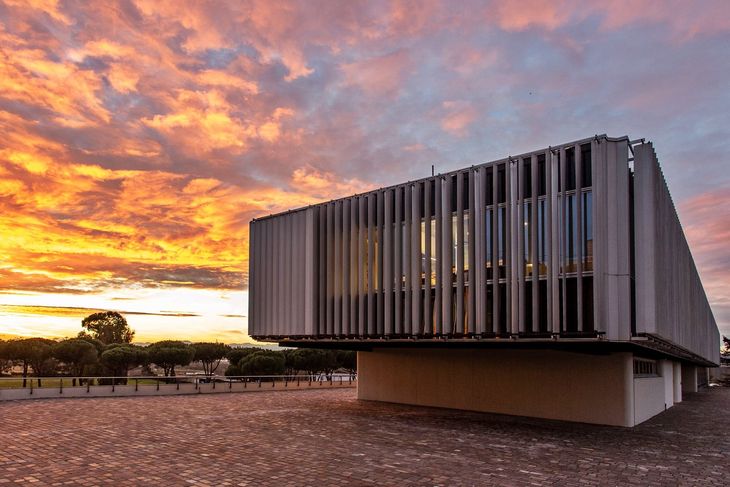GRAd-COV2
is a COVID-19 vaccine candidate based on a gorilla-derived replication-defective adenoviral vector.
Under development by ReiThera Srl, with a European partnership and phase I clinical testing to be started during July 2020 in Italy.
GRAd-COV2
ReiThera is developing a vaccine against COVID-19 based on a novel replication-incompetent simian adenovirus strain, encoding the full-length Spike (S) protein of SARS-CoV-2. The vaccine candidate is called GRAd-COV2.
ReiThera’s management and scientific teams have a long and successful track record in the field of viral-vectored vaccines and significant expertise in the manufacturing of clinical lots. In its premises in Rome ReiThera has fully equipped research laboratories, complemented by a state-of-the-art GMP facility and Quality Control labs.
Simian adeno-vectored vaccines represent a leading approach against emerging infectious diseases due to the advances in manufacturing processes, including scale-up, the excellent safety profile in humans and the rapid onset of humoral and cellular immune responses. Simian adenoviral vectors have been extensively used as delivery agents for genetic vaccine candidates against multiple infectious diseases, in different populations including elderly and infants. Reithera’s novel simian adenovirus (GRAd) belongs to species C adenovirus that are considered the most potent vaccine carriers. It has low seroprevalence in humans, compared to other simian Ads and human Ads, and an immunological potency comparable if not higher than the most potent other Ads.
GRAd-COV2 vaccine entered phase I clinical trials in late August in collaboration with INMI (National Institute of Infectious diseases) Lazzaro Spallanzani and GB Rossi University Hospital in Verona and is now preparing for phase II.
Trials show GRAd-COV2 is well tolerated and induces immune response
our insight of the week - December 19, 2020
photo courtesy company
The pandemic hit Italy like a thunderbolt. Within weeks the country became a cau-tionary example of how destructive COVID-19 can be if not contained. At the end of November more than 50,000 people had died from the infection in Italy – but hope is growing. ReiThera, a Rome-based biotech, is making a major contribution to the R&D efforts to find an efficient vaccine.
Preliminary results from the biotech firm’s ongoing Phase I study now show that its COVID-19 vaccine candidate, GRAd-COV2, was well tolerated and induced clear immune response in 45 healthy volunteers aged 18 to 55 at all three doses tested. The cohort was divided into three study arms of 15 subjects who received one of three escalating doses of GRAd-COV2.
“We are making great progress”, says Antonella Folgori, Chief Executive Officer of ReiThera. “Italian citizens have volunteered in numbers to take part in the trials. It tru-ly is a collaborative effort with a shared goal.”
The study is run jointly with the Lazzaro Spallanzani National Institute for Infectious Diseases (INMI) in Rome. The Italian Ministry of Scientific Research and the Lazio region provided support to the study, both financially and through the provision of clinical material. The trial is now investigating GRAd-COV2 in the second set of three cohorts of healthy elderly subjects aged 65-85 years. Results are expected to enable the selection of a vaccine dose for further investigation in a Phase 2/3 trial.
Like the vaccine candidates developed by Johnson & Johnson or AstraZeneca (in col-laboration with the University of Oxford), GRAd-COV2 is based on a replication-defective adenoviral vector encoding the full-length coronavirus spike protein. How-ever, there is a small but significant difference. While Johnson & Johnson bases its vaccine technology on a human adenoviral vector and AstraZeneca on a chimpanzee one, the GRAd-COV2 derives from gorillas. ReiThera’s researchers believe this brings several advantages.
photo courtesy company
Firstly, this vector may promote a stronger immune response. Secondly, it has an extremely low seroprevalence in humans. That means the human immune system has had very little exposure to the gorilla adenovirus and is therefore unlikely to neutralize it. And thirdly, gorilla adenoviruses have shown great efficacy compared to other simian and human adenoviruses in preclinical trials. “That could mean such a vaccine could be administered as a single dose”, chief scientific officer Alessandra Vitelli points out.
Some doubts about the adenovirus approach towards the COVID-19 vaccine had been raised after AstraZeneca had to put its trial in the US on hold. But ReiThera’s researchers remain very optimistic. “Preclinical and clinical evidence have demonstrated that ReiThera’s vaccine technology is safe and induces robust cellular and humoral immune responses”, Vitelli says. “We are confident that we will see similar results in the trials with GRAd-COV2.”
As is true for all developers, it has become difficult to predict when exactly the vaccine will be ready to be delivered in the EU – and how much of it. But ReiThera is well prepared. “Based on our understanding of what are likely to become critical bottlenecks given the scale of the pandemic and the global need for vaccine production, we planned the scale-up even before the start of the Phase 1 trial”, Stefano Colloca, chief technology officer, says.
Reithera is collaborating with Leukocare, a formulation expert from Germany, and Belgian biologics manufacturing and scale-up expert Univercells. The goal of this early collaboration is to develop a vaccine formulation that will allow storage and distribution of GRAd-COV2 at 4°C, and to guarantee the production of millions of doses of consistently high quality.
Currently several governments, including the EU as a whole, is negotiating with ReiThera to secure potential doses of the candidate vaccine. “We still aim to be able to produce the vaccine as quickly as possible”, Colloca says. Nonetheless, he emphasizes: safety always comes first.
December 19, 2020 by kENUP
Building on ReiThera’s experience in Ebola
Our insight of the week - July 3, 2020
ReiThera's Antonella Folgori and Stefano Colloca, photo courtesy ReiThera
Italy, once the European epicentre of the COVID-19 pandemic, is fittingly at the forefront of the extraordinarily breakneck race to develop a vaccine to protect billions of people against the novel coronavirus (SARS-CoV-2).
ReiThera, a young biotech company based in the Italian capital, Rome, is working against time to develop and manufacture on a significant scale a vaccine based on a novel Gorilla adenoviral vector (GRAd-COV2) encoding the full-length coronavirus spike protein. This is one of a family of simian adenoviral (Sad) vectors used already against multiple infectious diseases such as Ebola.
Its chief technology officer, Stefano Colloca, has said: "COVID-19 has transformed our society on a global scale with devastating effect, particularly in Italy. We are very eager to answer the calls from our industry and society to join the global effort against this rapidly spreading virus."
Amid warnings from the WHO that the spread of the pandemic is, if anything, accelerating, companies like ReiThera are trying to compress the usual dozen years required to develop, produce and market approved vaccines into ten months or a year at most. Its vaccine is one of, as of WHO, perhaps 150 or so being developed around the world.
Antonella Folgori, its CEO, points out that ReiThera’s candidate is based on a proven technology that is safe and induces "robust" cellular and humoral responses. Similar vectors have shown to be safe among thousands of vulnerable individuals such as the elderly and infants – and are immunogenic and not hampered by pre-existing anti-human adenovirus antibodies.
Dr Folgori is experienced and wise enough not to over-promise, however. "Drug-makers and researchers have signalled that they are moving ahead at unheard-of speeds," she says. "But the whole enterprise remains dogged by uncertainty about whether any coronavirus vaccine will prove effective and how fast it could be made available to millions or billions of people..."
She adds: " Given the many challenges and the multitude of vaccine projects the best outcome may see none of them emerging as a clear winner and we will likely need many different vaccines."
ReiThera GMP manufacturing in Roma, photo courtesy ReiThera
That's why ReiThera, which has grown out of a team that first worked together in the early 2000s, has teamed up with a German and a Belgian company, Leukocare and Univercells, to form a pan-European consortium to accelerate the candidate's development as a single-dose vaccine. It's another example of how European firms are joining forces to help suppress and, hopefully, eliminate the virus by sharing their expertise and knowhow.
Munich-based Leukocare will provide a highly stable liquid vaccine formulation (for use in vial) while Brussels-based Univercells is offering its proven biomanufacturing platform to ramp up mass production of the vaccine candidate.
Already, according to Dr Colloca, the consortium is working to get the vaccine onto the European market by the end of Q1 2021. "Developing a vaccine as quickly and safely as possible requires a new model – with a fast start and many steps executed in parallel, before knowing what works and what doesn’t."
The first clinical trial, designed to test the tolerability of the vaccine and its ability to induce a specific immune response, starts this summer in Italy, with Phase 2/3 for evaluating safety and efficacy expected to get underway later this year once Phase 1 data are available. "We expect that the vaccine would be ready to vaccinate the most exposed people such as medical and healthcare professionals and highly vulnerable individuals in Q1 2021," Dr Folgori declares.
Illustrating the unprecedented and high-risk nature of the fight against Covid-19, ReiThera and its partners aim to kickstart manufacturing and stockpiling the vaccine from this coming winter, with a target of having 30 million doses available – assuming regulatory approval - in early 2021.
It's 18 years since the management team started working in the field of viral-vectored vaccines at IRBM/MSD before founding Okairos, a spin-off, in 2007 that was bought by GlaxoSmithKline in 2013 when they decided to set up ReiThera. But the team now hopes to compress that successful history into just months with its new vaccine.
July 3, 2020 by kENUP
ReiThera building in Roma, photo courtesy ReiThera

